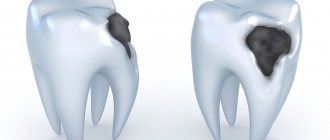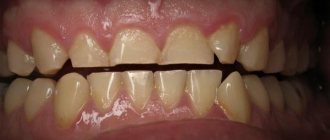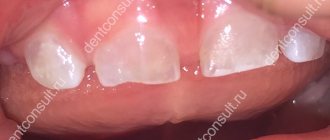Author of the article: Gadzhiev Ruslan Abasovich
Doctor-expert
Specialization: Dentist-therapist
Total work experience: since 2011
Reading time: 7-8 minutes
Tooth decay in general, and crumbling in particular, is not an aesthetic problem. In some cases, decaying teeth can be the result of not only dental, but also other types of diseases. To understand the topic and know why teeth crumble, what to do and which doctor to contact, you need to study all the important details.
Why teeth crumble - the main reasons and factors
Various types of tooth decay can be influenced by natural, mechanical and other factors. Sometimes this is a consequence of the neglect of some dental problem, and in other cases it is the result of the appearance of common diseases. Conventionally, all factors that can cause tooth decay are divided into three groups:
- External
:- Mechanical impact
. Strong clenching of the jaws, biting off hard objects, injuries - this is not a complete list of reasons that can lead to mechanical injury to the teeth. If the result is a violation of the integrity of the enamel, then the risk of not only the development of infections, but also the appearance of deformation increases. - Temperature
. The temperature of the foods you eat directly affects the condition of your teeth. Excessively hot or very cold dishes lead to the appearance of microcracks through which pathogenic bacteria penetrate, causing destruction/crumbling. - Chemical exposure
. Concentrated chemicals negatively affect the health of enamel. For example, its protective properties are significantly weakened by regular consumption of sour citrus fruits. - Improper oral hygiene
. This can be either individually incorrectly selected teeth cleaning products or irregular hygiene procedures. As a result, there is an accumulation of microbes that are destructive and will inevitably cause a number of diseases, including gums. - Domestic
:- Bad heredity
. Unfortunately, this is one of the factors that cannot be controlled. The tendency of teeth to decay, for example, due to thinned enamel, can be inherited and manifest itself at any period of a person’s life. The main task in this case is to slow down the destruction processes and focus on preventive measures. - Unbalanced diet
. In this case, a real chain reaction is triggered - the lack of a well-structured diet leads to metabolic disorders, resulting in a lack of useful vitamins and microelements necessary to strengthen the gums and enamel. As a result, for example, if teeth crumble, the reasons are a lack of fluoride and calcium and, as a consequence, thinning of dentin. - Hormonal instability
. Disruption of the endocrine system is one of the reasons for the development of caries, and its appearance is the first step towards tooth destruction. - Regular use of drugs
. Some therapeutic procedures and medications reduce the intensity of saliva production, which, accordingly, leads to negative consequences. - Chronic diseases
. Weakened immunity, for example, due to diagnosed oncology, hypertension, gastrointestinal disorders, etc. always negatively affects the condition of the teeth. - Vitamin deficiency
. To maintain healthy teeth, gums and the oral cavity in general, a person must consume sufficient quantities of vitamins B, C, E and D. Their absence in the diet or the inability to fully absorb them can lead to crumbling. - Bad habits
:- snacking on foods with excess sugar (lead to the formation of plaque, which destroys the enamel layer);
- biting third-party objects, for example, a pen/pencil, thread, wire, etc. (leads to mechanical damage);
- bruxism (night grinding of teeth leads to their abrasion and destruction);
- frequent consumption of drinks that affect enamel pigmentation (for example, coffee, red wine, carbonated drinks with artificial food colors);
- frequent whitening using folk remedies (increases sensitivity, has a detrimental effect on teeth in general);
- smoking (weakens the immune system and reduces the absorption of vitamins, which can cause vitamin deficiency).
The reason why teeth crumble may be one or several of the factors listed above. Be prepared that in order to solve the problem you will have to contact not only the dentist, but also reconsider your lifestyle, nutritional culture and oral hygiene habits.
Genetic predisposition
The quality of teeth depends on what kind of teeth the parents had. Dental heredity can manifest itself both in children, during the formation of teeth, and in adults. It is not the specific disease that depends on genes, but the predisposition to it.
Heredity affects:
- tooth structure;
- jaw shape;
- metabolism in the body, which influences the occurrence of caries.
Studies have shown that if both parents had the first manifestations of caries on their lower teeth, then the same row will be weaker in the child. Scientists also found that if mothers had bad teeth, then 90% of children subsequently developed various dental diseases.
Diagnosis and identification of the cause
Teeth crumbling is a consequence, but only a specialist can determine what the root cause is. It will take one or more appointments (depending on whether additional tests are required) to understand whether dental or some other reason led to the appearance of crumbling.
The diagnostic examination takes place in several stages:
- examination of the patient’s oral cavity to collect a detailed medical history;
- if the reason is not dental, then a recommendation is given to visit a doctor according to indications, for example, an endocrinologist, therapist, gynecologist, etc.;
- a referral is issued for blood tests (to identify possible pathologies, such as anemia, hormonal disorders, etc.).
Often, x-rays, ultrasound and other tests may be required. The more thoroughly information about your health status is collected, the higher the chance that the cause of tooth decay will be eliminated and it will be possible to save those that are not yet affected.
You might be interested in:
Online consultation
Dental restoration
Treatment of caries
Cervical caries
What to do with already crumbled teeth?
Whatever the reason, but if the fact of crumbling has already happened, you need to worry about the issue of restoration. Dental procedures in this case can be carried out in parallel with the elimination of the cause of teeth crumbling.
Recommended options for restoring crumbling teeth:
- Artistic restoration or filling
. Suitable for cases where a small area is crumbled and the resulting cavity is not affected by caries. Photopolymer materials are installed in place of the missing piece of fabric. - Prosthetics
.
The appropriate option is selected individually. The dentist may offer you: Veneers
. If the destruction has affected only the front part of the tooth and is purely aesthetic in nature, a ceramic onlay will help correct the defect. - Crowns
. If the tooth has crumbled very badly, then crowns made of metal-ceramics, ceramics or zirconium dioxide can be used for restoration. - Tabs
. They allow you to restore the destroyed part by replacing the missing tissue.
. It involves the implantation of an artificial root into the bone tissue, on which a crown is then installed. The method is indicated for those whose tooth could not be saved, which led to its complete loss.
Only a dentist can determine the optimal method for restoring crushed parts, and already at the first examination. Please note that if the problem is not addressed immediately, it may worsen and lead to complete tooth loss.
Symptoms
It is difficult to miss such a fact when a tooth has crumbled. This usually occurs while eating, and a hard piece of enamel is felt in the mouth. Sometimes there are many small pieces at once. There is a feeling of panic. After all, we know from school that enamel is the hardest tissue in the body. Why does this happen, causing teeth to crumble and crack?
It happens that it all starts with stains on the enamel - this is a symptom that not everything is in order. And you need to make a visit to the dentist before the crown of the tooth collapses.
Prevention of tooth decay
Already knowing why teeth crumble, it’s easy to draw logical conclusions about what you should give up and what you should take up as a habit as preventive measures. But, in fact, the list of recommendations for well-organized prevention is quite large. The main tips concern the following issues:
- Professional cleaning
. It is carried out to remove plaque and stone. - Remineralization
. It is carried out with the aim of restoring and normalizing the balance of vitamins in the dental tissues. To saturate the tissues with the necessary elements, a special composition is applied to the surface of the tooth for several minutes. After enrichment with fluorine and calcium, the fabric becomes stronger. - Fluoridation
. The use of fluoride-containing pastes that actively nourish the enamel. It is fluoride that is responsible for crystalline calcium compounds and helps strengthen teeth. - Taking active supplements
. With a predominance of calcium and vitamin D. - Rejection of bad habits
. Both in nutrition and in other aspects, for example, refusing to bite your nails. - Revision of the diet
. Regular consumption of seafood, fresh vegetables, fruits and cottage cheese is encouraged. - Rinse
(with water or special compounds). Recommended after every meal and snack. - Routine visit to the dentist.
Even if you have no complaints, it is recommended to schedule an examination at least twice a year.
Also try to avoid stress and walk outdoors more often. In addition, it would be a good idea to consult with your doctor about choosing the toothpaste that is best suited for you. And also purchase a soft brush, rinsing compositions and floss for cleaning the interdental space. Their regular use will be an excellent prevention.
Caffeine
Drinks containing caffeine (any type of coffee, cola, energy drinks) provoke dehydration and slow down the absorption of vitamins and minerals (including calcium). They stain teeth, change the color of enamel, making it darker. Therefore, dentists at the Dentospas clinic do not recommend drinking coffee in large quantities.
Caffeine also has beneficial properties: it contains fluoride and has an antibacterial effect, but coffee drinks do more harm to teeth than good. You can replace coffee with chicory. For those who are used to drinking a lot of green tea, it is better to switch to herbal teas.
You have questions?
We will call you back within 30 seconds
+7
Features of nutrition with increased fragility of enamel
If the problem of teeth crumbling is purely dental, then most often it is a consequence of thinning and brittleness of the enamel. If you solve the problem solely aesthetically, your teeth will continue to deteriorate. The most correct option is to follow the nutritional recommendations, observing two basic conditions:
- Normalize the functioning of the gastrointestinal tract (for complete absorption of mineral salts).
- Ensure the supply of essential minerals and vitamins from food and more.
Make it a habit to eat 5-6 times a day, eating small portions of food each time. Avoid foods that are difficult to digest and harmful (including processed foods).
Try to regularly consume foods rich in:
- Phosphorus
: eggs; - high-quality natural cheeses;
- nuts;
- sesame;
- pumpkin and sunflower seeds;
- greenery;
- seafood;
- beef and veal.
:
- fish (in particular sardines and herring);
To ensure the necessary chemical reactions, it is very important to consume clean water regularly and in sufficient quantities. For an adult, the norm is 1.5-2 liters per day.
Brief conclusions
If you notice that your teeth are crumbling, but do not experience pain, this is not a reason to delay going to the dentist. Get ready for the fact that the problem that has arisen will have to be solved comprehensively, turning to doctors of various profiles and solving not only dental, but also other health problems. If your teeth are crumbling, the causes can only be determined and eliminated by a specialist.
And most importantly, do not neglect preventive measures that will help maintain the integrity of your teeth and healthy gums.
Stages
Caries, like a secret agent, begins to act on the sly and may not make itself felt for years. Its initial stage is called the “white spot stage.” Well, how can you see white on white? That is why it is important to visit the dentist regularly - the specialist will highlight the white spot against the background of the enamel and cure caries in time. And if you start it, the disease goes to the next level:
- Surface.
The enamel is still intact, but in the area of the stain it becomes rough. The stain deepens. The tooth begins to react to cold and hot. - Average.
Caries penetrates to the dentin, but it does not provide access to the pulp. A damaged tooth reacts to temperature, mechanical, and chemical stimuli. But the pain is not constant, it goes away quickly. - Deep.
The pain is sharp when touched, but gradually subsides. A carious cavity is visible to the naked eye.
Read also
What is dental restoration
If the aesthetic properties of teeth are lost, a person experiences certain discomfort.
What to do if your tooth aches
Sometimes aching pain in a tooth can appear for no apparent reason at first glance.
Malocclusion
Malocclusion is diagnosed in the majority of the population. But, people go to the clinic for its correction only in case of a pronounced anomaly, although due to malocclusion the following occurs:
- Uneven load on teeth when chewing food. For some of them it is double the amount, while others are inactive. Due to excessive pressure, dental tissue is destroyed, leading to tooth loss.
- Reduced chewing activity, since not every tooth can participate in the process. To chew food well, you need to close your jaws tightly, but if you want to do this, discomfort and pain often occur. As a result, the composition of bone and soft tissue is disrupted.
An incorrect bite provokes the occurrence of an inflammatory process in the gums - periodontitis. In some people, due to an abnormal bite, involuntary grinding of teeth occurs - bruxism, which causes tooth wear and loosening.









